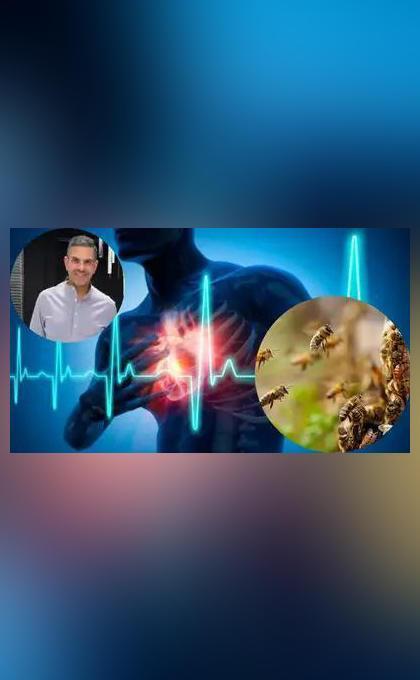
How Can Swallowing a Bee Lead to Cardiac Arrest?
When we think of bee stings, we often imagine a painful and itchy bump on the skin that will eventually subside with some antihistamine cream and a cold compress. However, in some cases, a bee sting can lead to a life-threatening allergic reaction that can even cause cardiac arrest. The recent tragic death of industrialist Sunjay Kapur, who died of cardiac arrest after accidentally swallowing a bee during a polo match in England, has highlighted the risks associated with bee stings.
According to experts, swallowing a bee can trigger a severe allergic reaction known as anaphylaxis in individuals sensitive to bee venom. This reaction can be triggered when a bee stings the tongue, throat, or airway, causing the venom to spread quickly through the body.
When a person is stung by a bee, the venom is released into the skin and causes an inflammatory response. In most cases, this response is mild and localized, causing redness, swelling, and itching at the site of the sting. However, in individuals with a severe allergy to bee venom, the response can be much more severe and life-threatening.
Anaphylaxis is a severe, whole-body allergic reaction that can cause a range of symptoms, including:
- Swelling of the face, lips, tongue, or throat
- Difficulty breathing or swallowing
- Rapid heartbeat
- Dizziness or fainting
- Abdominal cramps
- Nausea or vomiting
If left untreated, anaphylaxis can lead to a range of complications, including cardiac arrest, respiratory failure, and even death.
In the case of Sunjay Kapur, it is believed that the bee stung his tongue, causing the venom to spread quickly through his body and triggering anaphylaxis. The reaction was severe and rapid, leading to a sudden drop in blood pressure and cardiac arrest.
So, what are the risks associated with swallowing a bee? According to experts, the risks are high for individuals with a known allergy to bee venom. If a person with a bee sting allergy swallows a bee, the venom can spread quickly through the body, triggering anaphylaxis and potentially life-threatening complications.
There are several reasons why swallowing a bee can lead to cardiac arrest. Firstly, the venom from the bee can cause a sudden drop in blood pressure, which can lead to inadequate blood flow to the brain and other vital organs. This can cause a range of symptoms, including dizziness, fainting, and even cardiac arrest.
Secondly, the venom can cause the airways to constrict, making it difficult to breathe. This can lead to respiratory failure, which can further exacerbate the risk of cardiac arrest.
Finally, the venom can cause the heart to beat irregularly, leading to arrhythmias and potentially cardiac arrest.
So, what can individuals do to prevent anaphylaxis and cardiac arrest after a bee sting? According to experts, there are several steps that can be taken:
- Individuals with a known allergy to bee venom should carry an EpiPen or other epinephrine injector with them at all times. If they are stung, they should administer the medication immediately and seek medical attention.
- If a person is stung and experiences any symptoms of anaphylaxis, including difficulty breathing, rapid heartbeat, or dizziness, they should seek medical attention immediately.
- Individuals who are stung should avoid scratching the affected area, as this can cause the venom to spread further and increase the risk of anaphylaxis.
- If a person is stung and experiences any symptoms of anaphylaxis, they should call emergency services and seek medical attention immediately.
In conclusion, swallowing a bee can lead to cardiac arrest in individuals with a known allergy to bee venom. The risks associated with bee stings are high, and individuals with a known allergy should take steps to prevent anaphylaxis and cardiac arrest.
Source:






